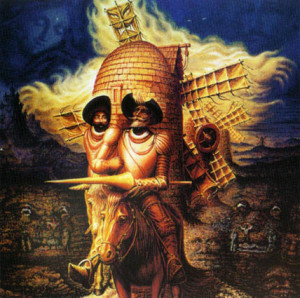We’re almost half way. I can speak for all of us when we say we are very much looking forward to the end of Part One. Last Tuesday, Blaze considered quitting, and the one thing that kept her going was the end when she’d be able to say she read it. I think that goes for all of us. I personally struggle to understand why and how this book has had such a great influence on so many great writers. Even if those writers had read it in the original Spanish, I find it hard to believe that the language is better, surely more romantic. But then I have to remind myself that this is the very first novel written according to the literature canon. So, I have to cut the book some slack, it being the first and all. And I do have to appreciate how many narrative ploys are deployed in this book that are still commonly used today, i.e. frame tales, first person narrative, third person narrative, authenticity, truth statements, character development techniques, and boy is it about culture.
We compared it to Dickens and Moby Dick. Everything seems to fall into place in Dicken’s world, and if you took out the cetology chapters in Moby then the book would be at most a few hundred pages long with very large print.
Alas, there are still a few points that keep me, us, reading.
It was Blaze who thought of Dickens when reading these last 100 pages. In a very small nutshell, we meet many different characters in this last reading, and in each of their stories everything seems to work out for them. And in the present narrative, things seem to work out for everyone involved. Of course, nothing that occurs really has anything to do with our Don Quixote.
What I would like to relate is what Blaze said about Dickens. First of all she said she hated him, and second she said a professor once told her that in order to understand Dickens, we have to understand that his characters are not of our world but in a moral world of their own. You see, Dickens wrote his own universe, where bad things happen to bad people and good things happen to good people. Our world doesn’t work like that. To translate that to the infinite fortune of our characters at the inn at this time, means if you are good in a Christian context then God will favor you and your endeavors. All I can say is this must be true, since everyone around Don Quixote prospers from being around him, and only Don Quixote, sworn by Knight’s Errantry, goes against pure Christian morals and ethics of being.
Don Quixote feels himself outside the normal scope of trivial life here in Spain. After the big fight at the inn, where our captive, priest, barber, judge, and Cardenio fight the Holy Brotherhood, and everything is finally settled, one of the Holy Brotherhood officer’s pulls out a warrant for Don Quixote’s arrest. At this Don Quixote is astounded and surprised and uses Knight’s Errant law as a defense, saying:
“Your low and base intelligence does not deserve to have heaven communicate to you the great worth of knight errantry, or allow you to understand the sin and ignorance into which you have fallen when you do not reverence the shadow, let alone the actual presence, of any knight errant. Com, you brotherhood of thieves, you highway robbers sanctioned by the Holy Brotherhood, come and tell me who was the fool who signed an arrest warrant against such a knight as I? Who was the dolt who did not know that knights errant are exempt from all jurisdictional authority, or was unaware that their law is their sword, their edicts their courage, their statues their will? Who was the imbecile, I say, who did not know that there is no patent of nobility with as many privileges and immunities as those acquired by a knight errant on the day he is dubbed a knight and dedicates himself to the rigorous practice of chivalry? What knight errant ever paid a tax, a duty, a queen’s levy, a tribute, a tariff, or a toll?”
Hahahahaha. So just imagine you get pulled over for speeding and you say to the officer, what student of high school has ever paid a ticket? What student has ever appeared in front of a judge to plead their case against a speeding ticket? The officer would laugh, wouldn’t you agree? This is what Don Quixote is doing here in this moment in the book. The Holy Brotherhood is really a police body of Spain to keep order in the lands. They also have religious connections. It seems that Cervantes is poking fun at Quixote’s ego and arrogance. Truly it was a delight to hear Quixote think he was indeed above the law.
Next, Blaze looked up the word errant. What it said was enlightening to this tale. It means traveling, seeking adventure, which is the definition Quixote refers to, and then it also means deviating from proper course. Hmm. Is it possible that the reason nothing is happening for Don Quixote or Sancho is that he is both seeking adventure but also deviating from proper course. I bring this up because it could shed light on why Quixote is so full of it. Perhaps, his misfortunes stem from his deviation from the Christian path and abides by only Knightly law. He goes above the laws of Spain and Monarchy, he goes above the laws of God, and goes against the love of courtship. Why would he be rewarded in a place where all the above are valued more than anything else? Why would he prosper from being a knight? He wouldn’t and doesn’t. Instead all of the other people around him prosper. Everyone’s problems at the inn that night are solved within a page or two of happenstance to all’s great delight. No one is left disappointed but Don Quixote and Sancho.
On the other hand, if it wasn’t for Don Quixote and Sancho, none of the fortunate events that took place for those unfortunates would have taken place. So in this light, everything that has happened, happened because of Don Quixote’s madness path. All of the lover’s are restored, and the lost relative’s are reunited with their families. Quite amazing.
This would also mean that Don Quixote is the frame tale for everyone else that appears in the novel. Nothing but bad things have happened to Don Quixote and Sancho, and most of the time nothing at all has happened. But for everyone else we’ve met something has happened. As far as I can tell the only one that hasn’t prospered from Don Quixote’s knighthood is the boy who was whipped in the beginning of the novel. This servant boy is the only one who has actually had negative outcomes from Don Quixote’s help. So I am sure he will come back again to complete the novel in wholeness.
Which brings me to wholeness and the group’s discussion about good art and wholeness.
At the end of our reading we are confronted with a canon. A canon is a man, I am not sure of what importance or service. Nevertheless, the canon stops our party from returning Don Quixote home, and asks why they have Quixote in a cage. Sancho speaks up for himself and isn’t as donkey headed as we thought. He is actually paying attention to what is happening around him, and he isn’t just following but also he is listening.
Anyway, the priest takes the canon ahead and fills him in on what exactly is happening with Don Quixote. The next thing we know we are in a full on conversation about the merits of good literature and the poor taste of chivalric novels. According to the canon, what makes a novel good is its wholeness. Do all the parts: beginning, middle, and end, correspond to all other parts. If it does then it is good, then it has merit, value, and is delightful. This is the classic argument of good literature and has stayed that way for a very long time. However books that simply delight, like books of chivalry, are simply foolish and the canon had yet to finish one because as soon as he starts he finds the book to be exactly the same and so stops.
Blaze pointed out that here Cervantes seems to be making fun of his own book. Not that it is a chivalric novel; it seems quite clear he is making fun of that, too, but also poking fun at the fact that it doesn’t have a strong narrative arc. It doesn’t really start or climax at any point. When we think something is getting started, the exact opposite occurs. When we think our characters are going to run into trouble, something happens and trouble is avoided. Nothing corresponds to anything, and it seems like reading on a treadmill. We think we are running through this book, but really we haven’t even started.
Like I said in the beginning, we are very much looking forward to the end of Part One, and a nice Spring Break…
The Writing Lab

